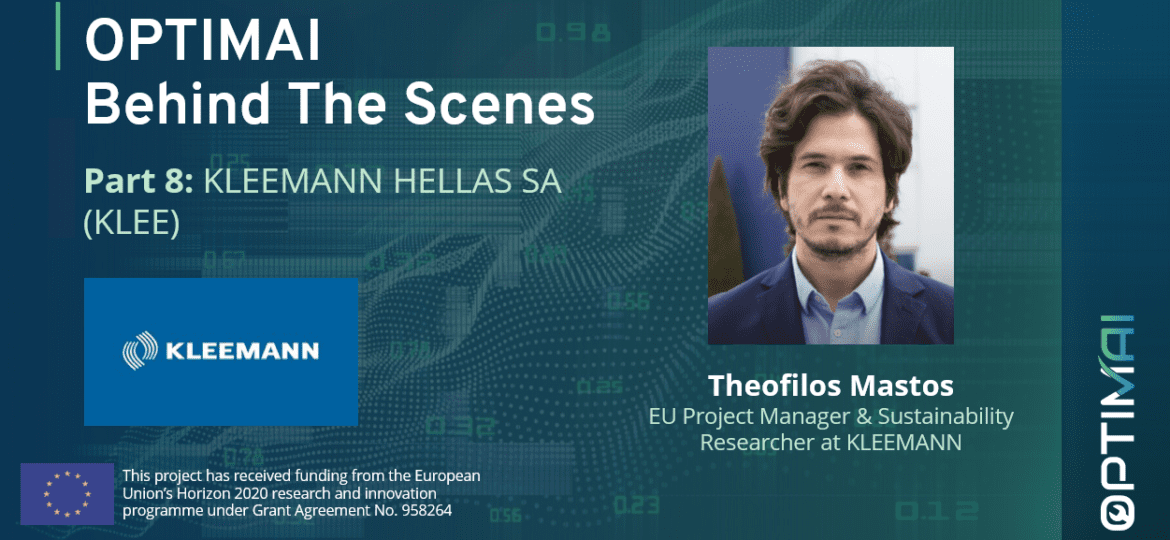
Up next in OPTIMAI’s Behind The Scenes interview series is KLEEMANN HELLAS SA (KLEE). We spoke to Theofilos Mastos, Sustainability Researcher and EU Project Manager at KLEE about his experience of working on an H2020 project like OPTIMAI.
Hi Theofilos, thanks for speaking to us today. Could you start by introducing yourself and telling us where you are based?
Hello, my name is Theofilos Mastos and I am an EU Project Manager at KLEEMANN. Founded in 1983 in Kilkis, Greece, KLEEMANN is one of the most important lift companies in the European and global market, providing any type of residential or commercial passenger and freight liſts, escalators, moving walks, accessibility and marine solutions, parking systems, and lift components. The company’s distribution network expands to more than 100 countries. Installation and maintenance companies handle the distribution of the company’s products all over the world.
What does your typical working day in the OPTIMAI project involve?
A typical working day involves mainly WP virtual meetings with other partners from the consortium, emails, and writing-up deliverables. Due to the pandemic restrictions, meetings with colleagues from the shop floor to identify the shop floor needs have been significantly reduced.
What is your main task in the OPTIMAI project?
KLEEMANN is participating as a pilot partner in OPTIMAI. The developed OPTIMAI solutions will be deployed in the company’s hydraulic lift plant and more specifically in the power unit’s testing lab. The ultimate goal of the pilot testing is to automate quality inspection processes towards zero defects, to provide optimal calibration in the production line and to improve overall production planning.
Apart from being one of the main pilots of OPTIMAI, KLEEMANN is responsible for the identification of user requirements and the definition of the OPTIMAI use-cases.
Has working remotely affected your work on OPTIMAI in any way?
Work from home has indeed affected the work in OPTIMAI. However, KLEEMANN has supported and implemented remote work many years before the pandemic, so it was not something new for us. What was new was the duration of working remotely (1.5 years), which provided a very flexible working environment, leading to higher employee satisfaction and increased productivity. But, at the end of the day, I have to say that remote work should be offered to the employeeσ for 2-3 days per week. Physical meetings with colleagues are very important for building strong relationships, developing new ideas, etc. Remote work and remote meetings cannot replace face-to-face meetings.
What makes your organisation ideal for participating in the research/activities of OPTIMAI?
KLEEMANN offers a real-world industrial environment, where state-of-the-art technologies can be applied, and research activities can be conducted. This is what makes the organization ideal for research projects. Both industries and research institutions benefit from results that have been produced by real-world demonstrations. What is key to enabling this research-friendly environment is the company’s personnel, who is more than willing to participate in research projects either by providing data or information related to the project or by managing and coordinating pilot work packages and tasks.
What do you see as the biggest challenge for OPTIMAI?
Remote working and COVID-19 restrictions such as physical or social distancing are the biggest challenges since project partners are not able to visit the pilot shop-floors where the solutions of OPTIMAI will be applied. This means that technical partners need to understand through videos, deliverables, and teleconferences what the pilot needs are and what the possibility of risks arising are. The technical partners’ experience and expertise is the key enabling factor to overcome these challenges.
Could you describe the overall expected impact of the OPTIMAI project in three words?
Optimised Decision Support.
What would be your advice to anyone interested in getting involved with a Horizon Europe project?
From an Industry perspective, the benefits of being involved in research projects such as the Horizon Europe projects are multiple. The key benefit is the collaboration and networking that is developed with other industries, companies, SMEs, research institutions, universities, etc. from around Europe. This collaboration and networking help companies to stay up-to-date with state-of-the-art technologies.
The significant funding provided from such projects, if combined with the company’s R&D needs, offers the opportunity to demonstrate, at a pilot level, the integration of new technologies in existing manufacturing or other operational processes. This helps companies to understand the strengths and weaknesses of a specific technology in a real-world case.
Last, but not least, and in order to maximise the impact of the project, key results can be exploited down the supply chain of a product or service, or act as input to the development of refinement of industrial/manufacturing processes.
Thank you for taking the time to speak to us, Theofilos! We look forward to more updates from the team at KLEE.
To keep up to date with the Behind The Scenes series and all OPTIMAI updates, make sure to follow us on Twitter, LinkedIn and YouTube.

